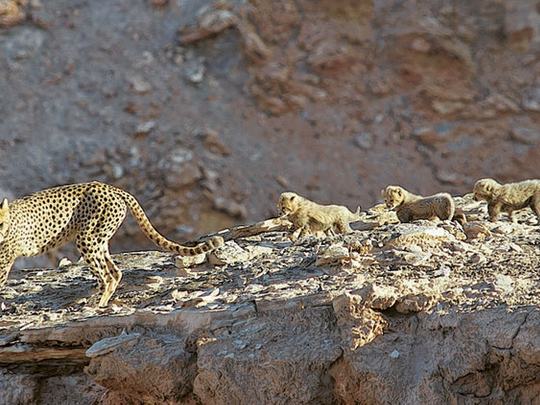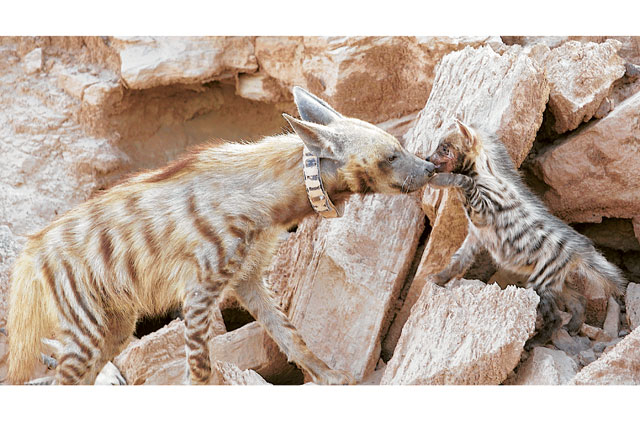
Sir Baniyas Island: Safira, a free roaming female cheetah on Sir Baniyas Island, is pronouncing that the Earth is no more a male dominant bastion. She is not doing it noisily by outshining two male cheetahs in the same territory in hunting skills.
Safira hunted down a sand gazelle within a couple of hours of her release into the wild. But her male companions — Gibbs and Gabriel — had to roam here and there until the second day [of their release to the wild] to manage a successful hunt, Aimee Cokayne, Conservation and Research Officer at Tourism development and Investment Company (TDIC), told Gulf News.
The trio [Safira, Gibbs and Gabriel], who are part of six free roaming cheetahs on the island, were taught to hunt by the conservation team of TDIC as part of rewilding process.
Rewilding is a term used to describe the process by which an animal bred in captivity or raised by humans is taught natural behaviour to be able to survive in a wild environment.
"As part of the Sir Bani Yas Island Carnivore Project, we have taken three adult cheetahs bred in breeding centres in the UAE and applied methods to encourage their natural instincts, have taught them to hunt and be self-sufficient requiring no more aid from humans to survive," Cokayne said. The male cheetahs took longer than Safira to learn their skills.
Safira took four months to rewild whereas Gibbs and Gabriel took six months.
Safira has been free ranging on the island for over a year and Gibbs and Gabriel for almost 10 months. They never needed any assistance from humans during this time. They have not only been feeding themselves but also successfully bred.
Safira made headlines in April 2010 when she gave birth to four cubs as they were the first cheetah cubs to be born in the wild in the UAE in 38 years. Safira raised the four cubs as wild cheetahs with no help from humans.
Baby animals learn a lot from watching their mother's behaviour and from playing with their siblings.
The cheetahs were moved into separate but adjacent enclosures within the Arabian Wildlife Park on the island so they could get used to the area and environment and have a large space to learn their hunting skills.
Ecosystem
The rewilding of cheetahs on the Island has a two-fold purpose. As part of creating a working ecosystem, these predators will control the herbivore population like gazelles and create a natural balance.
The second phase of the project was a breeding program for both the cheetah and the striped hyenas to preserve these species for future generations.
Striped hyenas and cheetah are both extinct in the UAE and are internationally classified by the IUCN (International Union for Conservation of Nature) Red List as ‘near threatened' and ‘vulnerable' respectively.
Creating more space
- 4,200 hectare -area of Arabian Wild Life Park on SirBaniyas Island n 87 Square kilometre-area of the island.
Balancing the nature
The Arabian Wildlife Park on Sir Baniyas Island, developed by Abu Dhabi's Tourism Development and Investment Company (TDIC), is a nature reserve that aims to recreate a working ecosystemSpanning over 87 square kilometres the natural island is located 250 kilometres from Abu Dhabi.
The park is surrounded by a 32km fence and is home to several thousand free-roaming animals, indigenous to the Arabian Peninsula. These animals include the endangered Arabian Oryx, Sand Gazelle, Arabian (Mountain) Gazelle as well as predators and scavengers such as the cheetah and hyena.
"We have several species of ungulates (antelope, gazelles) in the park. In order to control the herbivore population and prevent them from destroying the island fragile eco-system, we introduced different species of predators which will eventually create a natural balance," said Aimee Cokayne, Conservation and Research Officer.
Hyenas
Male and female striped hyenas have also been re-wilded and are free-ranging in the Arabian Wildlife Park since August 2009. This project has also been very successful and has resulted in the birth of four cubs in two separate litters which are being raised by their parents. The elder cubs are now hunting with their father, but visit the younger cubs to familiarise themselves with each other, on a regular basis.
— Source: TDIC













